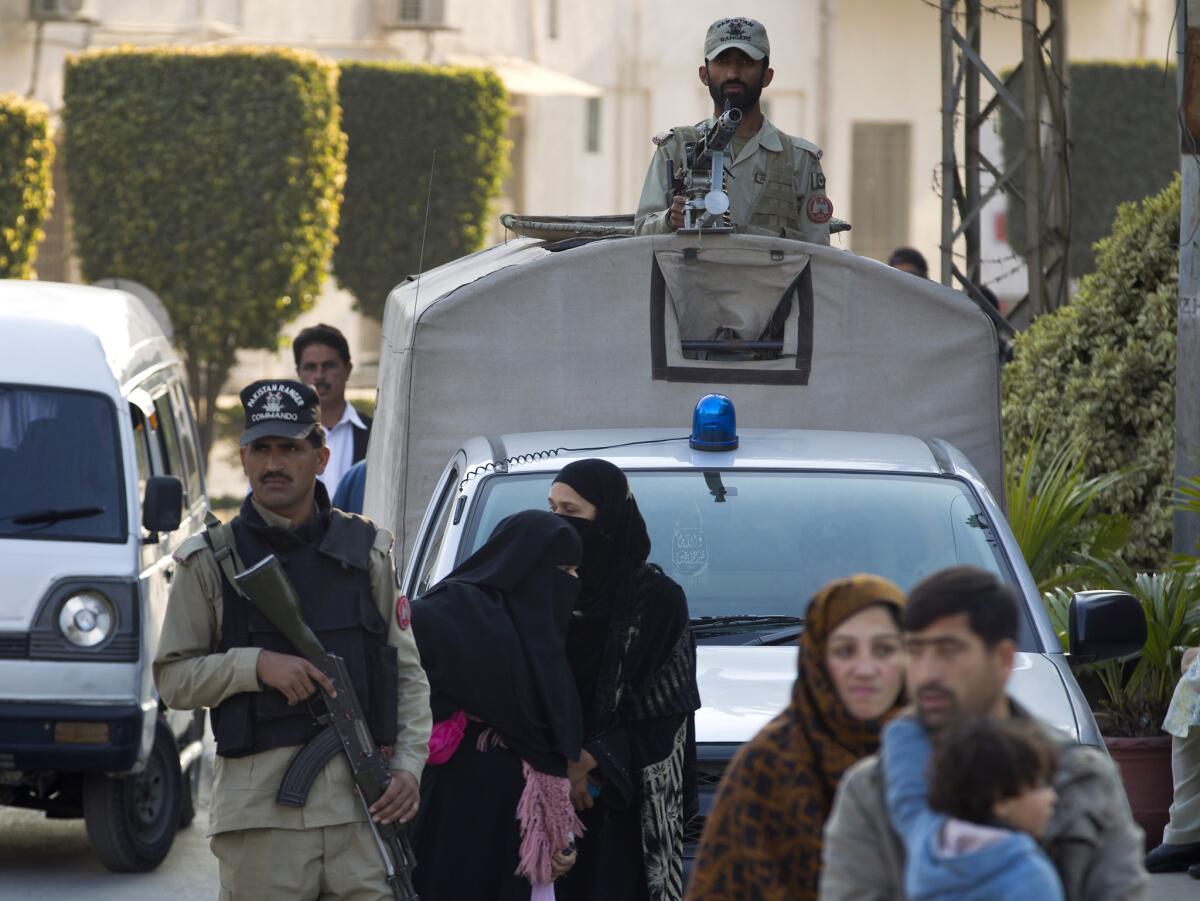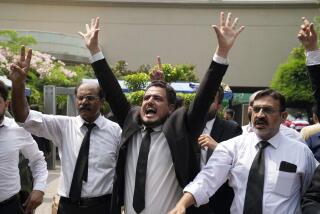Former strongman Pervez Musharraf may be leaving Pakistan

ISLAMABAD, Pakistan — He returned to Pakistan from self-imposed exile last March amid a media circus, death threats and boasts of reclaiming the presidency he once seized in a bloodless coup.
But Gen. Pervez Musharraf’s days in Pakistan appear to be numbered now that the former strongman has spent nearly a week in a military hospital complaining of health problems while avoiding a court appearance on treason charges.
The special court hearing the case on Tuesday began reviewing a medical report saying the 70-year-old Musharraf was suffering from blocked arteries, a spinal cord problem and hypertension. Musharraf’s wife, who lives in Dubai, has asked Pakistan’s interior ministry for permission for him to travel abroad for medical treatment, and officials close to the country’s security services said he could depart within days.
“It is good for everybody — including Musharraf — that he would go out of the country,” said a senior security official in Islamabad, who spoke on condition of anonymity because of the sensitivity of the case.
While his possible destination remained unknown, analysts said the former president and army chief’s presence in Pakistan has become a political headache for the 6-month-old civilian government of Prime Minister Nawaz Sharif. By attempting for the first time to prosecute a former senior military figure, Sharif’s government has ignited tensions with an all-powerful army establishment that is loath to see a former leader humiliated in a civilian court, experts say.
Army leaders were said to be frustrated with Musharraf’s decision to return to Pakistan last year, but last week he was swiftly admitted to the military hospital in Rawalpindi complaining of chest pains. Musharraf had been due to appear in court on the treason charges that day after missing two earlier appearances due to what his lawyers termed security threats.
The timing of his hospitalization, after he had appeared to be in good health in media appearances, fueled widespread speculation that the military was determined not to let Musharraf stand trial. The charges, which carry the death penalty or life imprisonment, stem from 2007, when Musharraf responded to mounting political opposition by suspending Pakistan’s constitution and imposing a six-week state of emergency.
Sharif “wants to use him as a bargaining chip to get more leverage against the military, but things could go worse if he keeps on going tough on Musharraf,” said Raza Rumi, a political analyst in Islamabad.
The former army chief, who seized power in 1999 and ruled until 2008, was one of the staunchest allies in President George W. Bush’s war on terrorism. Musharraf broke with Afghanistan’s Taliban rulers, accepted billions in U.S. military and economic aid and permitted U.S. warplanes to launch strikes against suspected Taliban-allied Islamic militants in Pakistan’s northwestern tribal areas.
The final months of his rule were marked by a series of constitutional crises, and he left power in August 2008 with the threat of impeachment hanging over him. Athough he returned to Pakistan with plans to run for president, his political support had all but dried up in his absence and he immediately was confronted with legal challenges stemming from his eight-year rule.
In a hearing this week, prosecutor Akram Sheikh accused Musharraf of intentionally defying the court and called on the judges to issue a warrant for his arrest.
Ahmed Raza Kasuri, Musharraf’s lawyer, replied that the prosecutor was merely trying to embarrass Musharraf, saying, “We will not tolerate the humiliation of our army.”
Analysts said that Musharraf’s departure for medical reasons increasingly seemed to be the only way to resolve the standoff between the government and the army over his fate.
“Musharraf’s safety is part of the army’s core interests, while with every passing day it would become tougher for the government not to try him,” said Ayesha Siddiqa, a security and political analyst. “The political temperature would keep on rising as long as his case remained pending.”
Sahi is a Times special correspondent. Times staff writer Shashank Bengali contributed to this report from Mumbai, India.
More to Read
Sign up for Essential California
The most important California stories and recommendations in your inbox every morning.
You may occasionally receive promotional content from the Los Angeles Times.










